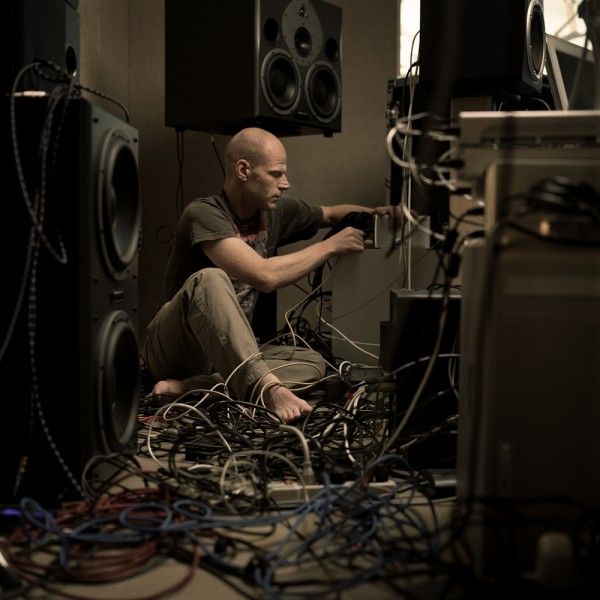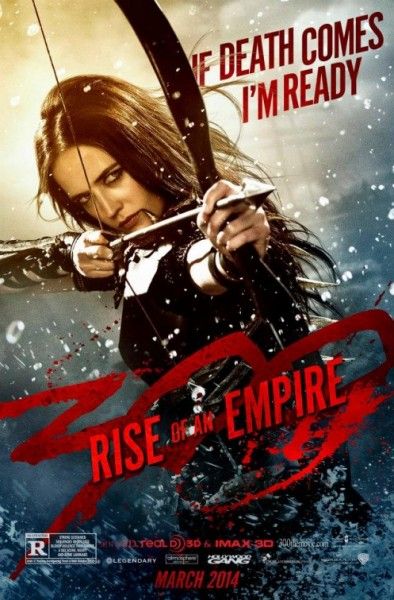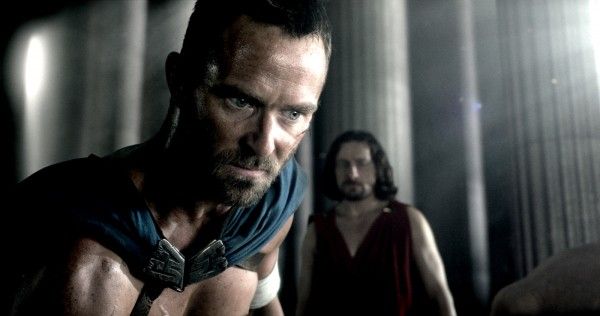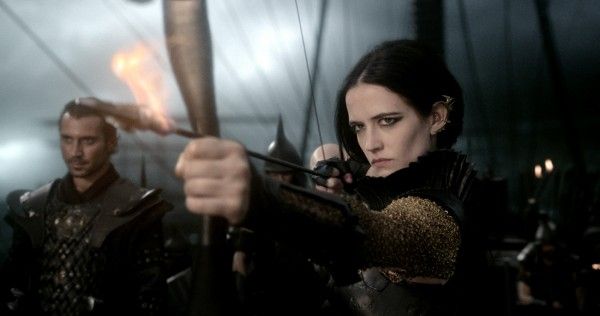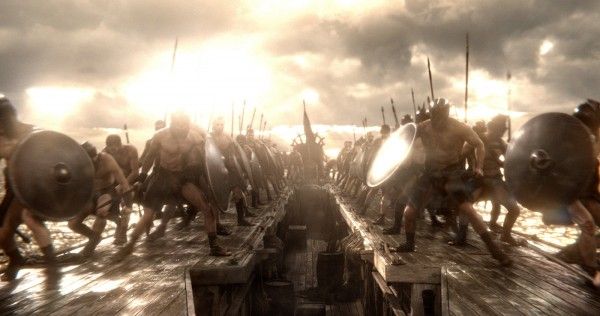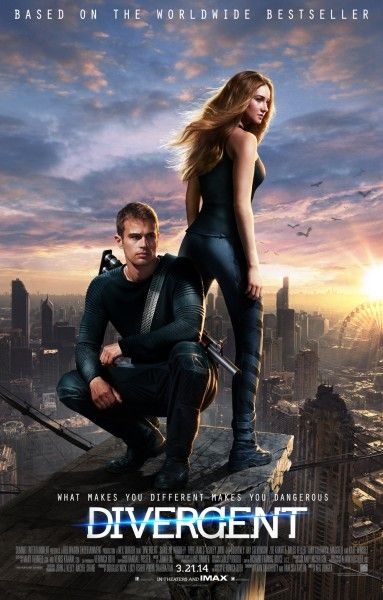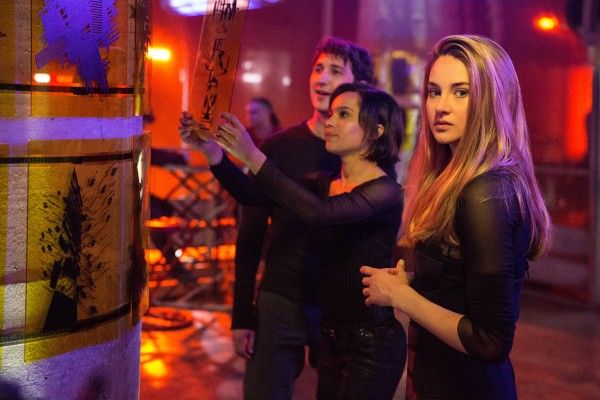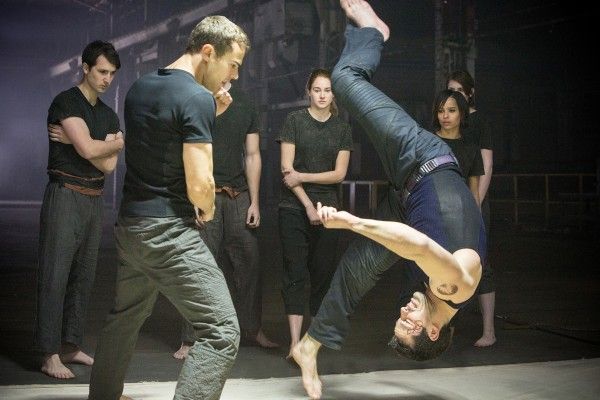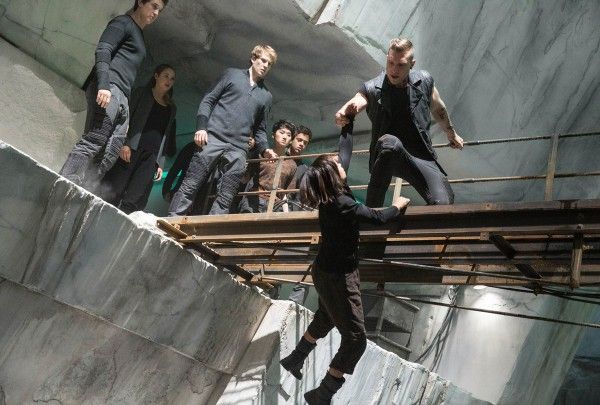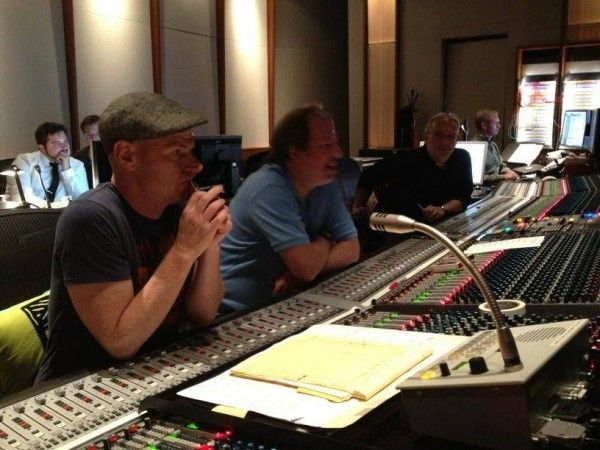Grammy nominated, multi-platinum producer and composer Tom Holkenborg, aka Junkie XL, is a skilled multi-instrumentalist whose versatility and mastery of studio technology put him on the cutting edge of contemporary music. His ability to combine electronic, pop, and classical influences has made him a highly sought after Hollywood composer. Most recently, he drew from his extensive knowledge of classical forms combined with his work in contemporary music to create the cool, exciting scores for the action thriller 300: Rise of an Empire and the futuristic action-adventure Divergent opening in theaters March 21st.
I recently landed an exclusive interview with Junkie XL who spoke about how he created a score for 300 that combined the film’s intense action and character themes with a thematic tone influenced by the sea, the challenge of capturing the world of Divergent from the first person perspective of its heroine, how he works with directors and draws on his eclectic background as an artist to craft the right sound, his Dutch roots and their influence on his music, his musical inspirations that include Pink Floyd and Nirvana, his collaborative relationship with Hans Zimmer and the possibility of working with him on Interstellar, and his upcoming projects: Mad Max: Fury Road and The Amazing Spider-Man 2. Check out the Junkie XL interview after the jump.
Question: You’re the composer on two new films: 300: Rise of an Empire and Divergent. I really enjoyed the music in both because it complimented and worked so well with the movie. Can you talk a little about how each of these projects came together for you?
JUNKIE XL: Well obviously they’re two completely different films that needed a completely different approach. With 300, it started because I was helping Hans (Zimmer) on Man of Steel and that’s how I got to know Zack Snyder. I got into the game of 300 pretty late. I got approached by Zack if I wanted to do this score and I was obviously very much up for it. After seeing the film, I wanted to try something that was very brutal but fresh at the same time. I basically wanted to do something strongly rhythm orientated and with sound design on original instruments from that time period or from that culture. For me, it was very important to underscore the fact that this is not like your typical traditional, historical drama, but this is like a comic book in live action version. It comes so close to what Frank Miller does, and I think Zack is pretty brilliant in making that work. I thought the music needed to be very modern and also almost like out of context to underscore that feeling for that movie, whereas Divergent is a completely different animal.
The most difficult part for me to capture with Divergent is that, for starters, it’s a movie that’s shot in first person perspective. I wanted to create a world of this main character. First she’s Beatrice and then she becomes Tris when she joins Dauntless. I needed to score the music constantly from her point of view. As you know, once she finds out that she’s Divergent, she basically can trust nobody and she doesn’t have friends and allies anymore. I thought the only people that can root for her are the audience. So, the music needs to pull you into her character. You need to sympathize with her. For me, the most important way to do that was actually not to approach it from an electronic perspective at first, because that is what you would expect for a futuristic movie. I actually wanted to start – and that’s how the movie starts – with three solid acoustic instruments that kind of draw you into that world and draw you into her head. And then, eventually her theme goes through all these different emotions, like whether she feels insecure or she’s not fitting in, to suspense, to fear, to friendship, to love, and eventually taking her into becoming a heroine. That was a really interesting journey to test that and figure out how I wanted to do that.
How do you decide what you want to do and what’s right to do when you consider a project?
JUNKIE XL: I trust my instincts. When I see a film or when I read a script, like ten pages in I know immediately if this is something for me and I really want to put my teeth into it. It’s interesting with both 300 and Divergent. With Divergent, I hadn’t seen the movie. I had just read the script. I had long talks with both the producers, Lucy Fisher and Doug Wick, and the director Neil Burger about what this movie was all about. Based on the script, I wrote 40 minutes of music just inside my head and I sent it out to them. I was like, “Does this work? Are you feeling this?” And with 300, I saw the film for the first time, and then immediately I had so many ideas about what I wanted to do for the film. So, for me, it’s purely based on my first instinct.
How do you create a score for a film that involves a story that plays out on an epic scale like 300: Rise of an Empire? How do you strike a balance between capturing the energy of the visual effects that we see on the screen and honoring the culture of the film’s time period?
JUNKIE XL: Well it’s interesting. 300 is not your bread and butter history film. It takes place in a certain time period, but for me, a movie like that is more about something else. It’s the art of the visuals and how to tell a story through the art of the visuals. If you look at it from that point of view, you can take some liberty with the music, I feel. It’s different from I would almost say Gladiator, which feels more like an historic drama. But how do you create a score with 300? It was really interesting because so much takes place at sea, and when I saw the film, the sound effects were pretty far developed at that point, and the waves had a rhythm to them, and I was really drawn into that rhythm. That became actually the first thing that I did. I tried to make a rhythm so I got on those waves. That became the basis for a lot of the rhythms on that score. When it comes to the traditional instruments, a couple of things I really looked into for starters were what kind of scales were very popular in old Persia and also still in modern Persia, because their music culture goes back so many years. Two scales stood out that I could work with. One was called the Homayoun and the other one is called Chahargah, and those scales you can work with in Western music pretty well. That became very important when it came to harmony and melodies from the Persian side of Greece, for instance, the theme of Artemisia and the theme of Xerxes. The instruments that I used for that are guitar and the sitar which are traditional instruments. A lot of the percussion for their themes also are traditional percussion instruments from that area, even though they’re highly beefed up with all the electronic means that I have at my disposal.
And then, for the Greeks, they used to have a traditional flute that was called the Aulos which is not being made anymore. I don’t think an original copy does exist. I’m not even sure actually, but that instrument is a couple thousand years old. We actually made one that came pretty close with its sounds with a flute player, and she made one on the spot from straws and with the right mouth piece. We got a sound that was supposedly pretty close to what that instrument should have been. So that became important for the Greeks. Besides that, I also wanted to make sure that I had an overall sound over the film that is not necessarily from any of those cultures but is just a really cool sound. I came up with this idea to build a piano. Basically, I took a really old piano and I got an axe and I hit everything away except for the inside train, and I built a holding case around it, and I started using bass and guitar pickups. It basically became an instrument that holds the middle between an electric guitar and a piano, and I would only play it with sticks. That instrument has become very important throughout the whole score, which is not a traditional instrument of any of those cultures, but I just thought it was a really cool element to have.
How do you work with directors like Noam Murro or Neil Burger to craft the sound? And does the studio give you any notes?
JUNKIE XL: Oh yeah. I mean, the world that we live in, in film scoring, is all about teamwork. As a musician, as a composer, you become a team player. That’s what really drew me into this world, because I had an artist’s career for 25 years where basically I could do whatever I wanted. More and more, over the last 15 years, I got drawn into film scoring and I got drawn into working in a team and bouncing ideas off among so many people. It totally depends. On one movie, you deal with one person. On another movie, you deal with a whole studio and the executive producers. It totally depends on the movie that you work on. I find it fascinating if I take Divergent as an example to talk with Neil for hours and hours and hours about what the purpose is of the film, about what the characters are, the journey that the characters are going through, and how I’m supposed to come up with the musical equivalent for that. Those conversations I find really, really fascinating and you learn so much from it. I think it’s one of the professions that you can still say when you’re 89, and I’m sure if you interview John Williams or Ennio Morricone, they would both say, “I’m learning every day.” Every day I’m learning something new about what you can do with the film. That’s what the beauty is of this journey as a composer.
How much of the music in these films did you compose and how much was used?
JUNKIE XL: For 300, I composed roughly 80 minutes and it’s all in the film and there were no leftovers. For Divergent, I tried a lot of different things. I experimented a lot. We ended up with 2-1/2 hours of music roughly, and I think eventually in the movie, it’s like one hour and 20 minutes is score and then there’s a lot of license music as well. The movie is close to 2 hours altogether, but it’s music pretty much the whole way through as you’ve heard. With Divergent, it’s also a very interesting mix between what is score and what is license music.
When there’s unused music, what becomes of it? Does it end up somewhere else or does it eventually end up online?
JUNKIE XL: You can’t really do anything with it because it contains very strong, thematic material. It’s not like, “Hey, I’ve got an 1-1/2 hours of music left. I’m working on this other film. I can use it for that.” Unfortunately, it doesn’t work like that, but it does create really interesting marketing tools for the film company to have a behind the scenes with extra music under it or deleted scenes on the DVD that they can use those bits of music for. There’s so much purpose for it.
How does having such an eclectic background and versatility as an artist contribute to the film scores that you create?
JUNKIE XL: What is unique with a background like that is that when something is asked of me, for instance 300, that is so relying on percussion, I can generally play all those instruments myself, because I have been playing drums for over 30 years. And when it comes to Divergent, from a first perspective of a 16-year-old girl, then it needs a modern approach and it needs almost a tough sensibility to it. We get to the point where we came up with the idea to collaborate with Ellie Goulding on this who really loved to do that. Then I don’t need to look far in my past to know what it was to make tracks like that on my own and to collaborate with a vocalist of that stature because I’ve worked with so many vocalists in my life from Dave Gahan, Depeche Mode, to Robert Smith, The Cure, to… I mean, the list is endless. That experience, having done all that stuff in the past, it really helps me now in film scoring that I don’t need to rely on looking for people who can solve that issue for me.
What did Ellie Goulding bring to Divergent?
JUNKIE XL: One of the things that is really unique is that we got an artist like Ellie Goulding, of that stature, to actually collaborate on the score. She made an extra track available that’s playing at the end of the movie and that they liked. Those two extra songs are in the film which is always great, but what is especially unique is that she really collaborated on the score and helped voicing the sounds of Tris in her voice. It was the last thing that was missing when I was working on the initial theme, and then we started talking about Ellie, and then we laid in her vocals that she did in special sessions for this. And then, it all came together. So, it was really nice to have that collaboration.
Which character or situation in these films was the most fun or challenging for you to create some music for?
JUNKIE XL: It’s totally different for every project. I have to tell you, on Divergent, it was the first time I think where I worked on a scene I had to shift emotions so many times within one piece of music. That was fairly new to me. That’s why doing this film was such an amazing learning curve, talking with the director about it, and he was like, “No, at this point, she kind of feels insecure, but then there’s a little bit of hope that this and this might happen, and then this happens and then that happens.” That was really challenging. It was fun to write a solution for that. That’s what film scoring is and that’s where the true art lies to do that. Another thing that I really like and that I have a lot of experience in is basically how to create a mood over 6 or 7 or 8 minutes where multiple shots happen, but the music just carries through and gives you the underlying emotion of what we’re supposed to be feeling at that specific point instead of trying to hit every scene. It’s like, oh now we’re this and now we’re that and now we’re this and now we’re so. Both those aspects, I really liked. I would say 300 is more of that last example where you have a certain type of emotion and you drive it through a longer scene, whereas with Divergent I had to play with the emotions of the characters more and it seems shorter in the timespan when I needed to shift.
How did growing up in Holland influence your music and you as an artist? How do you feel your roots helped develop you?
JUNKIE XL: Holland is a very interesting country. It’s a country that from years and years ago, we were one of those colonizing nations. We went out sailing and we brought all these cultures and music back to Holland. The music in Holland is very diverse, and it’s very focused on what goes on in the rest of the world. We have somewhat of a national scene that makes music in our own language, but we’re very much focused on what happens pretty much everywhere in the world. Growing up in Holland, I got exposed to all those different types of music styles. Plus I come from a family where my dad played instruments and my mom was a violin player and she taught music as a teacher. So it was very natural to play different instruments. I started with piano, and then it was the guitar, and then I got a drum kit, and then I started playing bass. It was very natural to be in that environment. I’m 46 right now, and I started playing in bands when I was 13, so that was in 1979 and 1980. It was a very interesting time period to play in bands and to grow up and mature. When I was 15, 16, 17, I worked in a music store, and then I got in contact with the first versions of music computers and synthesizers that became available to normal people, because before that they were over $100,000 or something like that, and only big bands could afford that. That was a really interesting time period. And then, I realized that the combination of what I knew as a classically trained musician and a multi-instrumentalist plus what a computer can do with all its new toys and whatever came out at that point, I knew that the combination of those two things, that would be my future.
As a child or as a young man, or at any point in your artistic career, was there music that really impressed you and made you say that’s what I’m aspiring to? Who or what were your inspirations?
JUNKIE XL: There are a few albums that I always bring up in a conversation like this. Even though those albums might change over time, I’m talking about specific time periods in which I realized that music was bigger than just a song on the radio. The first time was when I was 7 or 8 years old. My nephew was 10 years older than I was. He was 18 and he was like the cool dude. He’d come to our place and I loved to hang with him. He gave me this record and he said, “Why don’t you listen to this?” and that was Dark Side of the Moon (by Pink Floyd). Everybody started to get really worried about me when I came to school. I was 7 years old, and the teacher said, “Why don’t you bring some music. We’ll play music and then we’ll talk about it.” All the kids brought those kids’ bands like the Hannah Montana songs. They brought them to school and they played them and said, “Oh it makes me happy.” And then, I played On the Run which is the opening track of Dark Side of the Moon and the kids started crying. They got scared. I was like, “But I love this music and it’s such a trip and I’ve got all these fantasies.” I remember my teacher calling my parents to check if I was okay. And then, the second album was also from a time period like 1990 which was a very special year for me. I got my first international record contract and it was a beautiful year. And then, Smells Like Teen Spirit dropped from Nirvana. I remember hearing that track on the radio and I was just blown away. I was just like, "What is this?!” It was so appealing lyric-wise, even if you had no idea what the lyrics were about, and the music just grabbed me by the throat. Those two albums stick for me. I love so many different types of music from classical music to jazz to whatever, but those two albums really stick out in my personal experience hearing them for the very first time.
One of your upcoming projects is with director George Miller on Mad Max: Fury Road. What’s been your reaction to Mad Max so far? How did that project come together?
JUNKIE XL: I’m actually working on Mad Max right now. We’re finishing in two months. It’s a fantastic film. I mean, I can’t really say a lot about it obviously because it’s all hush hush. I can tell you that my experience with George has just been fascinating. We’re talking about an Oscar-winning director and he’s been around for so long. The conversations that we have together are really tickling my imagination. He pulls very deep inside of you to get the best that’s possible out of you. I find it a fascinating process. I got the movie because he heard the 300 score.
What kind of sound are you going for with the new Mad Max? Are there any special instruments you’re going to be using?
JUNKIE XL: I’m not allowed to talk about that, but it’s going to be a very interesting one. (Laughs)
Did you get to spend any time on set?
JUNKIE XL: No, because everything has basically been shot. They have some additional photography to do, but I haven’t been there which is great. I know, for instance, that Hans (Zimmer) has been multiple times on sets of directors that he got really well befriended with. He just came down to check out what was going on, but I think it has to be the right film to do that, and also you need to build relationships a little more. For me, it’s still like a fairly young career and I think as I go I hope to be in that same situation at some point.
You have a highly collaborative relationship with Hans Zimmer and you’ve scored five films together: The Dark Knight Rises, Man of Steel, Madagascar 3, Megamind and Inception. Will you be collaborating with him on Interstellar?
JUNKIE XL: Not at this point, because I’m pretty busy on my own. Some films we collaborate on that seem to be the right fit, and other ones Hans would like to do it on his own or with somebody else. He loves collaborating. I’ve been very fortunate to work with him on all these projects. I did work with him on the new Spider-Man (The Amazing Spider-Man 2) that’s coming out. So, it depends on what movie, and time, and things like that, but I’ve been very fortunate to work with him like that. He took me under his wings and he showed me in a one on one master class how to score a film. I’ve learned an awful lot from him and I will be thankful to him forever for doing that and showing me that.
Can you talk about Spider-Man 2? What has that experience been like so far and what are you contributing to that?
JUNKIE XL: At this point, I’m not allowed to say anything about that either. (Laughs) I’m really sorry. You know how it goes. That movie is still a while away from coming out, but I think Hans will be the first to talk about it and what he did for that.
Do you have any other upcoming projects that you’d like to talk about?
JUNKIE XL: No. At this point, I’m full on in Mad Max which is going to be done in two or three months. And then, after that, I’ve got a few options, but I’m not sure which one is going to go or which one I’m going to be picking. I mean, it’s still at an early stage. I’m not in that position yet to say, “Oh I’ve got movies going out for the next 4 or 5 years.” Hopefully, that will happen in the future, but at this point we’ll take one as it goes. Also, it keeps my mind really fresh and it also takes away some of the unnecessary stress that you feel like, “Oh this is coming up.” At this point, I only need to focus on Mad Max and at the same time enjoy that two films are coming out in one month that are supposedly both going to do great. So that’s great, too.


